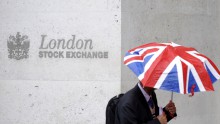It is 24th June, the day after the Brexit vote, and there’s a palpable mood of anger in London. We didn’t see this coming, and are in shock. The words ‘nightmare’ and ‘tragedy’ and ‘national suicide’ are being bandied about. One woman writes on Facebook that she feels ‘shattered, desolated, disappointed in humanity’, and however melodramatic the words sound, statistics say she speaks for the majority in the capital: we voted to remain by 60-40, and there have even been calls in the last few hours for the capital to break away from the rest of the UK so the Remainers here can have their way.
Our world has just shrunk massively, and for a long time we’re going to feel like a limb has fallen off. This is not a change we’ll adapt to quickly. We’ll carry on as though freedoms we’ve grown up with - cheap airfares, unrestricted travel, the right to healthcare in EU countries - are still with us. And we’ll find ourselves clunking into new, unwelcome legislation at every turn.
It shouldn’t have come as such a surprise. Nearly all of the people in my area I spoke to on the morning of the vote declared - with great emphasis - that they were voting Out, and the same explanation came up again and again: the NHS. They hadn’t been able to get a doctor’s appointment, the surgeries and hospitals were completely overloaded, we couldn’t go on like this any more. The difficulty of getting your children into a local school was another: there were simply too many visitors using our public services. And so on.
There are surely numerous reasons why Brexit has happened, and we’ll read all the theories - a post-mortem - in the following weeks. But a few occur immediately. Part of it, perhaps, is the atmosphere here, what George Orwell called the ‘deep, deep sleep of England’ (and it is England and Wales, rather than Britain: we’ll come onto that in a moment). It’s an innately conservative country, where we tend instinctively to assume that things will go on as they always have. We had the Scottish independence vote in 2014 - a lot of fire and thunder and polls predicting that the Scots were about to reject the United Kingdom. Then the vote happened, the Scots - just - voted to remain and things went on as usual.
As a result, many of us were sceptical this time round of the predictions at certain moments (though strangely not the night of the vote itself) that Brexit was pulling ahead. Surely, we thought, this couldn't happen. Surely this was just a spasm of protest that would die away before business returned to normal. Unfortunately Remain fought a poor campaign - it’s difficult to inspire people with a vision of things remaining exactly the same, and the Brexit-devil got all the best lines. They were the people fired by a new idea - however contentious - and they pressed it home with a more rabble-rousing sense of conviction. All of us Remainers are posting our Facebook elegies tonight, and they’re passionate indeed - full of a genuine grief at what’s happened. Why weren’t we (myself included) posting such things a few weeks ago, when it really mattered?
That 52 % of the British people lapped up the Brexiteers’ promises surely has its roots too in a general disillusionment with politics and politicians. In recent elections there simply hasn’t been enough difference between our two main parties’ political agendas to offer much hope of change - or at any rate, a change that people believe in. Here, for the first time, was a chance for voters to go outside conventional politics and vote for upheaval elsewhere. The Brexiteers have been handing out hope - of more money for schools, a better funded NHS, more securely protected employment and so on - in a way irresponsible and at certain moments outright mendacious. Yet faced with the promise, however false, of such concrete changes to their everyday lives, people have turned a deaf ear to loftier ideas of the brotherhood of nations and the European ideal. We’re unaware, as yet, of the staggering oddity of 70 years of relative peace in Europe, of how unnaturally lucky we have been. Surely, before long, we’ll realise our mistake.
Meanwhile, the country is now split down the middle. The argument has been won, and yet strangely, it’s only just starting, and for a long time it will matter hugely how the people around us voted: particularly as the effects of the UK withdrawal kick in, and the phrase ‘I told you so’ becomes commonplace. There are other, more lasting splits Brexit will bring in its wake too. The independence movement in Scotland (a country overwhelmingly for Remain) will press for a second referendum now, and this time they will win. The European Union is not the only one whose integrity we’ve undermined here - before long the name of the United Kingdom may too be out currency.
What have we done to ourselves? Tonight, like so many others, I look back at all the people I've met and befriended simply because they were allowed to live here. At all the delicious moments of travel where jumping on a plane to capitals like Tallinn or Madrid was as easy as getting a train up to Newcastle (and probably cheaper). Where you could consider living in any one of 28 countries as easily as you could think of living in your own. At a feeling that we were all - Belgians, Spanish, Romanians, Italians and, yes, Brits - part of one big family.
All this thrown away because of the demagoguery of a few 'hard-headed' men who know the price of everything and the value of nothing. We have only them, ourselves - and ‘the deep, deep sleep of England’ - to blame.








